IN THE US, NEARLY SEVEN MILLION INDIVIDUALS ARE UNDER “CORRECTIONAL SUPERVISION”: PROBATION, PAROLE, JAIL, OR PRISON. That’s almost 3% of US adults, the equivalent of half the population of Pennsylvania. This figure includes the one in 110 US adults who are incarcerated. In theory, these individuals are “the worst of the worst” — those whose behavior poses enough of a threat to others that they must be separated from the rest of society for a period of time for punishment and rehabilitation. Cairn alumni are serving in these places of justice and redemption. These are the stories of three alumni who have devoted their lives to working with the accused, the condemned, and those who have recently been liberated in more ways than one.
Before Bars: Matthew Reese G’12
Last spring, alumnus Matthew Reese G’12 began a new adventure, marking a welcome change for him and a desperately needed change for the state of Pennsylvania.
Since graduation, Reese had been working with the New Jersey Department of Corrections, assessing the mental state of inmates — and he was miserable. “My role was to minimize the county’s liability, and I did that by spending all of my time evaluating people and doing crisis intervention to prevent any kind of suicidal or homicidal activity,” he says. “We were severely understaffed. Treatment was almost nonexistent. It was about effectively managing these inmates and getting them from Place A to Place B — Place A being the jail and Place B being either back out on the street or to court and then up to prison — without any tragedy happening. That may look like medication, that may look like putting them on suicide watch, that may look like… Well, those were really the only things we did. It was a management model; it was not a treatment model.”
This management model did not sit well with Reese’s biblical worldview nor his training in Cairn’s Master of Science in Counseling program. “I didn’t go to school to learn how to keep a company or a county from getting sued,” he says. “I went to learn how to serve and minister to people. And you can’t do that when you’re expected to see 20 inmates a day, shuffle them along, and maybe never see them again. And they may be crying, weeping, and talking about their life stories, and you have to say, ‘We don’t have time to talk about that. Are you going to kill yourself?’”
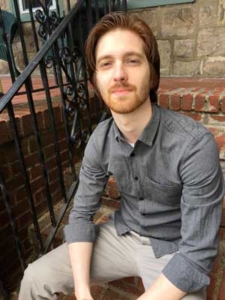
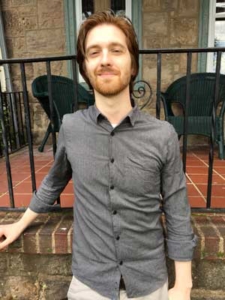 “I went to Cairn to learn how to minister to people. And you can’t do that when you’re expected to see 20 inmates a day, shuffle them along, and maybe never see them again. You have to say, ‘We don’t have time to talk about that. Are you going to kill yourself?'” – Matthew Reese G’12
“I went to Cairn to learn how to minister to people. And you can’t do that when you’re expected to see 20 inmates a day, shuffle them along, and maybe never see them again. You have to say, ‘We don’t have time to talk about that. Are you going to kill yourself?'” – Matthew Reese G’12So when he received a call last spring from New Vitae Wellness and Recovery to help establish an initiative revolutionizing Pennsylvania’s approach to forensic psychological treatment, Reese was more than ready to move on. His new target population: the criminally insane.
“‘Criminally insane’ is a legal term, not a clinical term,” Reese explains as he describes his patients. “A better description is ‘incompetent to stand trial.’ Most of the 400+ defendants deemed incompetent are simply very low-functioning people who have been very mentally ill for a very long time. If someone gets evaluated in jail and they cannot participate in their own defense — can’t explain who the judge is, what the prosecutor does, what their lawyer does — then they are deemed ‘not fit to proceed’ and court-ordered to be hospitalized and receive treatment to restore them to competency.”
However, for these patients, adequate care has been long in coming. In Pennsylvania, the average time severely mentally ill defendants spent in jail awaiting court-ordered treatment was 397 days. One of Reese’s clients, a man known as “J.H.,” spent 589 days waiting for one of the 190 treatment beds at Pennsylvania’s state hospitals.
J.H.’s crime? Stealing three York peppermint patties.
{ 397 }
the average number of days severely mentally ill defendants spent in jail awaiting court-ordered treatment
Spurred by an ACLU class action lawsuit resolved in January 2016, the state of Pennsylvania was required to create at least 120 new treatment slots for forensic “competency restoration treatment,” including at least $1 million dedicated to “supportive housing opportunities” informed by UPenn’s Beck Initiative.
One of these innovative residential facilities is New Vitae’s new South Philadelphia treatment site, a rowhome fitted to house 14 men dormitory-style, where Reese serves as a forensic mental health clinician. In addition to working individually with patients toward goals of either standing trial or reintegrating safely into the community, Reese works with a team of case managers, a psychiatrist, and others to implement an approach called “activation therapy.”
“Instead of traditional sit-in-a-circle group therapy, we’re getting them into clubs and groups, discovering and encouraging whatever their interests are, whether that’s nature or art or swimming at the Y. You see, these guys haven’t been doing much for maybe their whole lives. And we want to activate them, to engage them with the world, getting them to pay more attention to life and less attention to their delusional thoughts and hallucinations.”
The principle behind this approach is profoundly biblical: “As they engage the world, they start to be connected to others. And the Bible makes it clear that we’re created for relationship. The secular mental health field understands this in bits and pieces, but they don’t understand that it’s by design. That’s a huge component when you’re treating someone’s dysfunction: having an understanding of how we were created to function in the first place. At Cairn, that’s a central emphasis: understanding people and their nature in relationship to God as creature-Creator.”
This type of biblical insight is critical to the success of initiatives that impact society on a large scale — yet, Reese laments, Christians exert less influence over systemic solutions and policy than they should. “The need for well-trained, biblically minded professionals to be involved in these kinds of big projects is vital,” he says. “A residential treatment model with this forensic population and purpose is very new, and it’s getting a lot of attention, even internationally, because this is probably going to become the new model of competency restoration treatment. Yet there are very few ministry-minded people involved in this, in reaching out to these people who are really at the bottom of the bottom.”
Ultimately, he claims, the real measure of impact is always at the level of individuals, where the hope of Christ is needed most of all. “We’re dealing with people who are professional patients. The secular therapy model has nothing to offer these guys that they haven’t encountered in the past 10, 15, 20 years,” Reese says. “But from a spiritual perspective, there’s a lot that they haven’t been offered. The only thing I have to offer is what I learned at Cairn through a biblical lens. Satan has a foothold in these lives, and we can’t expect psychology to lift them out of that. Psychology doesn’t have what it takes. Only God can do that.”
Behind Bars: Joe Kadtke ’75
For those who have stood trial and been sentenced, the US correctional system ideally has a rehabilitative effect. For many, however, a changed life requires both a clear understanding of the gospel of Christ and a supportive mentor. Joe Kadtke ’75, former executive director of Prison Outreach of Delaware and facility chaplain at the Howard R. Young Correctional Institution, has been providing both in the Wilmington area for over 40 years.
“When Joe started, prison ministry was a new thing in many ways,” says fellow chaplain Steve Anderson ’98. “He really blazed the trail and started a lot of the programs.” These programs include traditional ministries such as chapel services, Bible studies, counseling, and discipleship. Kadtke trains the choir and the band, which lead worship for over 600 inmates at multiple services each week.
In addition, Chaplain Kadtke (dubbed “Chap” by inmates) teaches a video production class, attracting Christians and non-Christians alike. “One of the cool things about this ministry,” Kadtke says, “is that it provides an opportunity to share the gospel with men, including Muslims, who would never come out to our chapel services otherwise.”
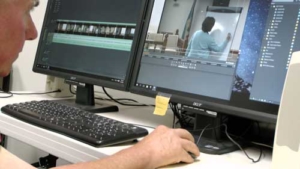
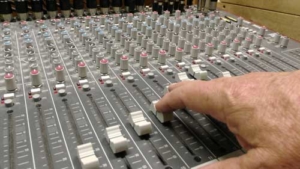 “One of the cool things about this ministry is that it provides an opportunity to share the gospel with men, including Muslims, who would never come out out to our chapel services otherwise.” – Joe Kadtke ’75
“One of the cool things about this ministry is that it provides an opportunity to share the gospel with men, including Muslims, who would never come out out to our chapel services otherwise.” – Joe Kadtke ’75Classes are taught from a biblical worldview perspective, addressing ethical issues such as honesty and integrity in film production and media manipulation by agenda-based organizations. With the stated purpose of preparing men to serve in churches and recovery-based organizations in their communities, Kadtke equips students to complete a project from start to finish, beginning with filming techniques and ending with video post-production and DVD authoring.
Kadtke’s programs open opportunities not only to share the gospel with inmates, but also to disciple new believers as they prepare for ministry themselves. One former inmate, Sonny Nolting, recalls, “Five days after I got locked up, I was really going through it. I honestly just wanted to kill myself. Chap came to see me, and I remember reading Romans 7:24: ‘Wretched man that I am, who will deliver me from this body of death?’ That was when the gospel I’d heard all my life started to become real.”
By the final year before his release, Nolting had become a chapel worker, leading worship, teaching Bible studies, and making (as Anderson shares) a “huge impact.” “He was leading guys to Christ more than anyone I’d met in jail in 15 years,” Anderson recalls. “In every pod, new believers were confessing an understanding of the gospel — and not just one or two. It was ten or more.”
{ 600+ }
the number of inmates attending Kadtke’s chapels weekly
Nolting shares that Kadtke’s mentorship played a critical role in his spiritual development during this time: “I talked with Chap four times a week for at least two hours a day, sitting under his counsel.” Today, he feels called to follow in Kadtke’s footsteps, serving Christ, whether in a professional setting or full-time ministry.
Beyond Bars: Steve Anderson ’98
When prisoners are released back into their communities, the struggle isn’t over. According to the National Institute of Justice, over 75% of reentering citizens are rearrested within five years — more than 50% within 12 months. Steve Anderson knows the challenges of recidivism firsthand: Before committing his life to Christ, he was incarcerated four times during a 10-year period of drug addiction.
Today, Anderson helps incarcerated men break the cycle the same way that it was broken for him: through the mercy of Jesus and submission to Him. Mentored by Kadtke since getting hired at Prison Outreach of Delaware 15 years ago, Anderson continues to work alongside him three days a week at Young Correctional Institution, discipling and counseling many of the men who attend Kadtke’s chapel services. Anderson also ministers to prisoners on work-release at the Plummer Community Corrections Center. However, he has a special place in his heart for “aftercare ministry,” Bible studies and accountability groups focused on discipling men reentering society after prison.
For Anderson, accountability groups are primarily about prevention, not repentance. “For me, accountability groups were always a place to go and say, ‘Guys, I messed up,’” he shares. “But in the Lord, as ‘iron sharpens iron,’ the real purpose of an accountability group is to come before you mess up and say, ‘I need the strength to not do what I’m tempted to do.’”
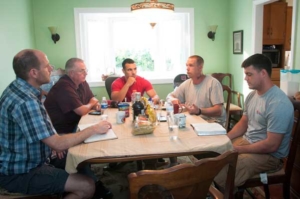
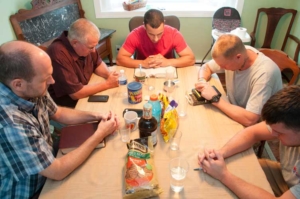 “It’s so important to stay accountable. There’s a freedom in that. When you come and share your sin, it’s not for forgiveness, but for healing. God forgives you, but when you share it with your brothers or sisters in Christ, you’re healing yourself.” – Tim Santa Barbara
“It’s so important to stay accountable. There’s a freedom in that. When you come and share your sin, it’s not for forgiveness, but for healing. God forgives you, but when you share it with your brothers or sisters in Christ, you’re healing yourself.” – Tim Santa BarbaraAfter years of experience, Anderson continues to learn better ways to help these men pursue godliness. Having recently transitioned away from a church-based large-group model, Anderson’s aftercare Bible studies now meet in triads in members’ homes — a switch that has proven transformational. “Since we started meeting in triads,” Anderson says, “these guys, who didn’t know each other before, have shared more personal stuff in just six months than I’d heard in quite a while before that [in the larger setting].”
But it’s not just the stable, small-group setting that lends itself to intimacy. Brandon Harvey, a triad member who also attends Anderson’s church, points out that Anderson himself and his testimony are key to the group’s success: “[This ministry] is important because all of us, including Steve, have been through the system, coming out of jail.”
Nolting, now a member of Anderson’s triad, agrees: “If I call Steve up and say, ‘Yo, Steve, I had a really bad day. I just really wanna get high,’ I know that he’s been there. He knows what that feels like.”
This common experience creates bonds much deeper than shared “war stories;” it lends itself to a higher level of accountability. Nolting explains, “Maybe one month I’m going off the deep end and drinking on the weekend and just not living the way that I’m supposed to — but when I go to church, I’m able to pull the wool over everybody else’s eyes like I have everything together. And it’s no fault to those people; they haven’t lived that life or been involved in that lifestyle, and I thank God for that. But in a close group like this, with three people that you’re really close to and have all been in similar situations… I can’t fool these guys.”
{ 75% }
the percentage of released inmates rearrested within five years
That transparency is essential for spiritual well-being, as the third triad member, Tim Santa Barbara, points out. “It’s so important to stay accountable. There’s a freedom in that,” Santa Barbara says. “When you come and share your sin, it’s not for forgiveness, but for healing. God forgives you, but when you share it with your brothers or sisters in Christ, you’re healing yourself.”
This accountability has been key for Harvey, who says, “The first two times I came out of jail, I failed; I’d read the Bible in jail and all that, but once I got out, it quickly disappeared. Without this [aftercare group], I would just veer back into my old wicked ways — if not crime, then just in everyday life.”
The Christ-centered friendships built in Anderson’s small groups are a powerful testimony to the hope of the gospel. Santa Barbara shares, “Don’t get me wrong: Church is great. But I love my brothers, especially the guys I see fallen in prison. I wanna give them a hope, the same hope that’s in me. When I first got saved, I used to say that I wish I could take pieces of myself off and say: ‘Here, try it.’ If I can help a fellow brother who lived in the street — who knows what it’s like to be homeless, to be poor, to be living in complete darkness and despair — I want to give him hope.
“And this is it: We’re living it. We love each other. We can talk to each other. We can put everything on the table, and there’s no judgment. All of us here, we’ve had that mentality of just savagery… and for brothers like us who have lived in the streets to turn to love one another, that’s an amazing thing.”